Summary of Findings
 Americans continue to hold more internationalist views than they did prior to the Sept. 11 terrorist attacks. The public favors cooperation with the United Nations and taking into account the views of U.S. allies to a greater extent than in the 1990s. Most notably, there has been a decline in the percentage of Americans holding the hardcore isolationist view that the U.S. should mind its own business internationally. Just three-in-ten agree with that statement today, compared with 41% in 1995 and 37% in early September 2001, just prior to the terrorist attacks.
Americans continue to hold more internationalist views than they did prior to the Sept. 11 terrorist attacks. The public favors cooperation with the United Nations and taking into account the views of U.S. allies to a greater extent than in the 1990s. Most notably, there has been a decline in the percentage of Americans holding the hardcore isolationist view that the U.S. should mind its own business internationally. Just three-in-ten agree with that statement today, compared with 41% in 1995 and 37% in early September 2001, just prior to the terrorist attacks.
These trends may help explain the public’s strong and consistent insistence that the United States get allied support for a war with Iraq. In that regard, the Pew Research Center’s latest survey finds continued general support for possible military action against Iraq. However, a plurality of Americans (44%) also believes that there has been too little discussion of ways to deal with Saddam Hussein other than using military force. And the public remains closely divided over whether President Bush has made his case for war.
Amid talk of war with Iraq and government warnings of the continuing threat from al Qaeda, public concerns over a new terrorist attack are at their highest level since summer. More than seven-in-ten Americans (73%) say they are at least somewhat worried there will soon be another attack in the U.S., with three-in-ten (31%) very concerned about such an attack. Fears of terrorism are now as high as last June, following the arrest of an American accused of planning a “dirty bomb” attack.
 The Pew Research Center’s latest national survey, conducted Dec. 4-8 among 1,205 adults, finds 65% supporting potential military action against Iraq. That is virtually unchanged from November, when 62% backed military action, but higher than in October when 55% favored the use of force to remove Saddam Hussein from power.
The Pew Research Center’s latest national survey, conducted Dec. 4-8 among 1,205 adults, finds 65% supporting potential military action against Iraq. That is virtually unchanged from November, when 62% backed military action, but higher than in October when 55% favored the use of force to remove Saddam Hussein from power.
Fears that an attack on Iraq could increase the threat of terrorism in this country are much greater than they were during the Persian Gulf War. After the war began in January 1991, just a third expressed a great deal of concern that war might result in domestic terrorism. But in October of this year, half (51%) expressed a high level of concern there would be increased terrorism.
Yet there are no signs that these concerns are dampening support for military action against Iraq. In fact, Americans who are most worried about the threat of terrorism are even more supportive of military action against Iraq than those who express little or no concern. In the current survey, roughly seven-in-ten (71%) of those who are very worried about another terrorist attack in the U.S. favor the use of force in Iraq. By comparison, 54% who voice relatively little concern over a new terrorist attack back military action.
Bush’s Ratings Steady, Partisanship Resurgent
After a brief spike around the one-year anniversary of the Sept. 11 terrorist attacks, public approval of President Bush’s job performance has remained steady over the fall and early winter. Currently, 61% approve of his performance while 28% disapprove. That is largely unchanged since late October (59% approval).
 But partisan divisions over President Bush’s performance, which diminished dramatically following the terrorist attacks, are once again as large as they were during his first days in office. While 88% of Republicans are happy with the president’s job performance, 58% of political independents and just 34% of Democrats agree. This is comparable to an April 2001 Pew Research Center survey in which Bush won the approval of 87% of Republicans, 56% of independents, and 36% of Democrats.
But partisan divisions over President Bush’s performance, which diminished dramatically following the terrorist attacks, are once again as large as they were during his first days in office. While 88% of Republicans are happy with the president’s job performance, 58% of political independents and just 34% of Democrats agree. This is comparable to an April 2001 Pew Research Center survey in which Bush won the approval of 87% of Republicans, 56% of independents, and 36% of Democrats.
This partisan divide also is evident in personal evaluations of the president. Currently, 68% of Americans say they have a favorable impression of Bush, up slightly from 61% in July 2001. The president is viewed favorably by 94% of Republicans, 68% of independents, and just 42% of Democrats. As was the case before Sept. 11, more Democrats feel unfavorably toward the president (53%) than feel favorably (42%).
Despite these modest ratings from Democrats, there is no question that Bush has rallied the intense support of his partisans. Not only do 94% of Republicans rate the president favorably, fully 61% give him very favorable reviews, up from 45% in July 2001. At no time in his eight years in office did President Clinton receive comparably strong ratings from Democrats.
Election Reaction: Nothing Like ’94
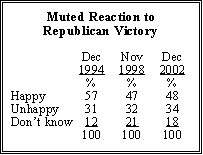 On balance, the public is pleased that the Republican Party gained control of the Senate on Nov. 5. But the public’s overall reaction to the election result is no more enthusiastic than it was in 1998, when the GOP lost seats and narrowly maintained control over Capitol Hill.
On balance, the public is pleased that the Republican Party gained control of the Senate on Nov. 5. But the public’s overall reaction to the election result is no more enthusiastic than it was in 1998, when the GOP lost seats and narrowly maintained control over Capitol Hill.
Just under half (48%) say they are happy that the Republican Party won control of the Senate; 34% say they are unhappy. This is distinctly less than the level of enthusiasm following the 1994 Republican sweep of the House and Senate, when 57% expressed satisfaction with the outcome. Republicans and Democrats, not surprisingly, hold opposing views on the election outcome, while the opinions of political independents match the overall trend.
Nearly six-in-ten Americans (59%) rate the Republican Party favorably, while 54% say the same about the Democratic Party. This represents the first time in seven years that the GOP has been the higher rated party; in the late 1990s, the Democrats often held a double-digit edge over Republicans in favorability. This shift has occurred gradually: Republican favorability is up only slightly from two years ago (56% in January of 2001, 59% today), while Democratic favorability has slipped six points (from 60% to 54%).
The political environment was much more favorable to Republicans following their huge victory in 1994. In December of that year, favorability ratings for the Republican Party surged 21 points from their 1992 level (from 46% to 67%) while ratings of the Democratic Party dropped 11 points (from 61% to 50%). Following that year’s GOP landslide, 34% of Democrats felt favorably toward the Republican Party; today, 28% of Democrats have a favorable view of the GOP.
Government Ratings Fall
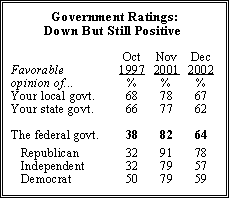 Governments at all levels continue to receive favorable ratings from a majority of the public, although views are somewhat less positive than they were in the months just after the 9/11 terrorist attacks. But even with the downturn, the federal government at 64% favorable remains much more popular than it was prior to 9/11. State and local governments have returned to roughly the same level of favorability seen before the terrorist attacks.
Governments at all levels continue to receive favorable ratings from a majority of the public, although views are somewhat less positive than they were in the months just after the 9/11 terrorist attacks. But even with the downturn, the federal government at 64% favorable remains much more popular than it was prior to 9/11. State and local governments have returned to roughly the same level of favorability seen before the terrorist attacks.
Two-thirds (67%) have a favorable view of their local government, while ratings of state government are slightly lower (62%). Favorable ratings for local government are down 11 percentage points since November 2001. Ratings of state governments most of which are now confronting serious financial problems are down 15 points since November 2001 and stand four points below their 1997 level.
Ratings of the federal government have suffered a larger decline than ratings of state and local governments, falling 18 percentage points from their high of 82% last fall. But the current 64% favorable rating still stands considerably higher than the 1997 rating of 38%.
Opinions about the federal government are a mix of feelings about government in general and views of current public officials. Republicans today are much more positive toward the federal government (78% favorable) than are Democrats or independents (59% and 57%, respectively). In 1997, the pattern was reversed: Democrats had the most po
sitive attitudes toward the federal government (50% favorable), while Republicans were less favorable (33%).
Republicans have similar views about state government. Among Republicans living in states with Republican governors, views of state government are very positive (73% favorable). In states with Democratic governors, Republicans are less positive: 56% have a favorable opinion of their state government. But the same pattern is not seen among Democrats, roughly two-thirds of whom view their state government favorably whether they have a Democratic or a Republican governor.
Increased Backing for the U.N.
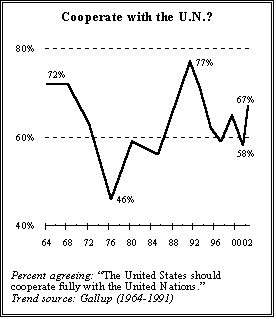 The survey shows that, in general, public support for a cooperative approach with the U.N. and major U.S. allies has risen since the Sept. 11 terrorist attacks. Two-thirds say the U.S. should cooperate fully with the U.N., up from 58% in early September of last year. Similarly, 85% believe the United States should take into account the views of its major allies, compared with 80% in September 2001.
The survey shows that, in general, public support for a cooperative approach with the U.N. and major U.S. allies has risen since the Sept. 11 terrorist attacks. Two-thirds say the U.S. should cooperate fully with the U.N., up from 58% in early September of last year. Similarly, 85% believe the United States should take into account the views of its major allies, compared with 80% in September 2001.
Americans also reject the notion that the U.S. should go its own way in international affairs: 72% disagree with that statement, up 10 points since early September 2001. And while most Americans (65%) continue to believe that the United States should focus less on international issues and more on building prosperity at home, a greater proportion disagrees with that view (31%) than any point since the mid-1980s. In the 1990s, after the Cold War ended, there was much less dissent from the notion that the U.S. should concentrate more on domestic problems.
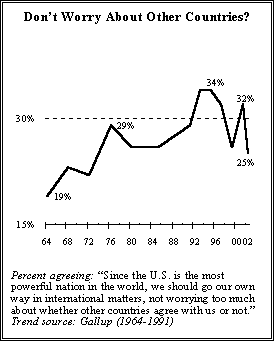 Significantly, much of the shift in the direction of greater internationalism has come among Republicans. For example, in the summer of 2001, 38% of both Republicans and Democrats said the U.S. should mind its own business and not get involved in other nations’ problems. Far fewer Republicans say that today (22%), while Democrats have shown little change on this question (40%).
Significantly, much of the shift in the direction of greater internationalism has come among Republicans. For example, in the summer of 2001, 38% of both Republicans and Democrats said the U.S. should mind its own business and not get involved in other nations’ problems. Far fewer Republicans say that today (22%), while Democrats have shown little change on this question (40%).
Interestingly, at the same time that Republicans have become more internationalist, they have also become more multilateralist. Prior to the terrorist attacks, Republicans were significantly more likely than Democrats (40% to 29%, respectively) to say America should pursue its own interests internationally and not worry about whether other countries agree with us. Again, Democrats have not changed their view on this question, but far fewer Republicans (22%) say we should not be concerned about gaining cooperation from other countries.
Both parties have become more supportive of the idea that the United States should cooperate with the U.N. Before the terrorist attacks, fewer than half of Republicans (47%) felt the U.S. should cooperate fully with the United Nations; today, 58% subscribe to that view. There have been comparable increases among Democrats, but overall Democrats remain much more supportive than Republicans of the U.N. (79% vs. 58%).
Most Want U.N. Inspectors to Get Tougher
Most Americans want the United States to closely cooperate with the U.N., but when it comes to Iraq, they want the U.N. to take a more aggressive stance in investigating Iraq’s weapons program. A solid majority (55%) believes that U.N. inspectors are not going far enough in ensuring that weapons will be discovered, while about half as many (28%) believe the inspectors have gone far enough.
Supporters of military action, in particular, believe that the inspectors have not been aggressive enough. More than six-in-ten of those who favor the use of force against Saddam Hussein’s regime say the inspection team is not going far enough; just a quarter are satisfied with the level of scrutiny. Opponents of military action, by comparison, are divided: 42% say the inspectors are not going far enough while 40% believe they are.
For the most part, public attitudes on Iraq have changed little over the past few months. Roughly six-in-ten are paying a great deal of attention to the debate over whether to use force to oust Saddam from power. That is slightly more than the number who closely followed the debate in early October and mid-September (54%, 55%).
Americans remain divided over whether the president has offered a clear rationale for why the United States should take military action against Iraq. Fewer than half (48%) say Bush has made such a case, while nearly as many (45%) say he has not. If anything, the president has lost ground on this issue since mid-September, following his widely praised speech on Iraq before the United Nations, when 52% felt he was clearly explaining the stakes in Iraq, while 37% did not.
Force Favored, But Interest in Alternatives
 Public support for military action is not only broad, but it remains strong as well. While 65% favor the use of force to remove Saddam from power, fully half (51%) say they feel strongly about this, while just 13% say they could change their minds. Overall, a quarter oppose military action, but just 16% are strong opponents and 9% say they still could change their minds.
Public support for military action is not only broad, but it remains strong as well. While 65% favor the use of force to remove Saddam from power, fully half (51%) say they feel strongly about this, while just 13% say they could change their minds. Overall, a quarter oppose military action, but just 16% are strong opponents and 9% say they still could change their minds.
Support for military action has risen only slightly since last month (62%), but has increased by 10 points since late October. Since then, there has been a sizable increase in support for the use of force among Democrats (13 points) and independents (12 points). Democrats, who opposed military action by 40%-51% in late October, now support it by 53%-36%.
As in previous surveys, older Americans are clearly the most wary about going to war. Just over half of those age 65 and older favor the use of force against Iraq, the lowest proportion of any age group. By comparison, nearly seven-in-ten (69%) of those under age 30 favor military action against Iraq. Similar age patterns on the use of force have been evident for decades, including during the Vietnam War. (See “Generations Divide Over Military Action in Iraq,” Pew Research Center Commentary, Oct. 17, 2002).
Yet young people also are the most likely to say there has been too little discussion of alternatives to using force. A solid majority of those under age 30 (56%) believe nonmilitary options have received too little attention. Among other age categories, only about four-in-ten hold that view. That is the case for those age 65 and older, despite their reservations about military action.
There is greater agreement between the young and old that the president has not explained clearly the stakes involved for the U.S. in Iraq. Roughly half of those under age 30 and age 65 and older believe Bush has not clearly explained what’s at stake in Iraq. Those age 30-64 are more likely to say that the president has offered a clear rationale for why force may be needed in Iraq.
Iraq Debate Tops News Interest
The public is paying more attention to the ongoing debate over the possibility of war with Iraq than to any other news story this month, with fully half (51%) saying they are following the story very closely.
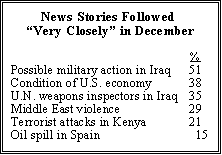 Interest is on par with earlier measures in September and October, and this remains among the top news stories of the year. More than eight-in-ten Americans are following this story at least fairly closely. Proponents and opponents of military action express the same level of interest in the story, as was the case during the fall.
Interest is on par with earlier measures in September and October, and this remains among the top news stories of the year. More than eight-in-ten Americans are following this story at least fairly closely. Proponents and opponents of military action express the same level of interest in the story, as was the case during the fall.
Fewer Americans are following reports about the work of United Nations weapons inspectors in Iraq. About a third of the public (35%) says they are following this story very closely, with another 39% following it fairly closely. Interest is as high as it was in February 1998, when President Clinton was threatening air strikes over weapons inspections in Iraq.
About three-in-ten (29%) are following very closely news about the continued violence between the Palestinians and the Israelis. Interest in this continuing news story has dropped significantly s
ince the spring. In early April, fully 44% were following news about the Passover suicide bombing and Israeli forces entering the West Bank and Gaza Strip.
Terrorist attacks in Kenya against Israeli citizens garnered the close attention of only about one-in-five Americans (21%), with another 34% following fairly closely. This is almost identical to American news interest in the terrorist bombing in Bali, Indonesia earlier this fall (20% very closely, 34% fairly closely).
A large oil spill polluting the coast of Spain was closely followed by only 15% of the public, considerably lower than the 52% who reported following the Exxon-Valdez oil spill off the coast of Alaska in 1989.
Reports about the condition of the U.S. economy attracted the close attention of about four-in-ten Americans (38%). As is generally the case, people with household incomes above $50,000 were more likely to follow this story very closely than those with lower incomes (47% compared with 32%). At the same time, more Democrats than Republicans are following this story very closely (48% vs. 32%).
In terms of public awareness, roughly half of the public (49%) knew that legislation had been enacted creating the new Department of Homeland Security. Majorities of Republicans and independents (55%) were aware of the establishment of the new department, compared with 41% of Democrats. Far more Americans knew this than were aware of the enactment of accounting reform legislation earlier this year; just 28% knew that bill had become law.


